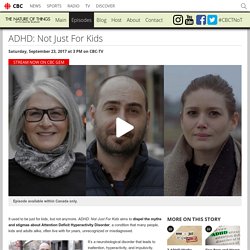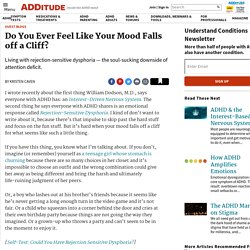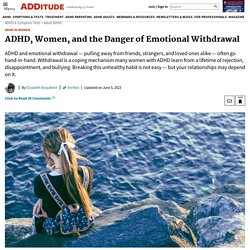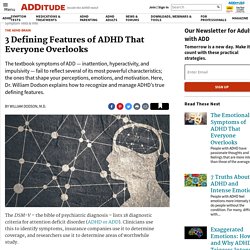

ADHD: Not Just For Kids. ADHD: NOT JUST FOR KIDS Written & Directed by Michael McNamara Produced by Judy Holm Michael McNamara Aaron Hancox Editor Eamonn O’Connor Director of Photography Marc Lamy Original Music Composed by Kurt Swinghammer Production Coordinator Matt da Silva David Bertrand Additional Camera Walter Corbett Rich Williamson Raj Nandy Aaron Hancox Camera Assistants Raj Nandy Tommy Keith Jordan Kawai Sound Recordist Michael McNamara Animation Design & Director Luke Murphy 1st Assistant Editor Kyle Gregory Sanderson 2nd Assistant Editor Trevor Horigan Graphic Effects Artist Anne Feldman Visual Research & Clearances Matt da Silva Dialogue Editor Barry Gilmore Re-Recording Mixer Graham Rogers Assistant Re-Recording Mixer Will Stephens ADR Recordist Marcel Ramagnano Audio Post Project Manager Alex Åslund Project Coordinator Erin Lewis Digital Colourist Drake Conrad Project Manager Brandon Tobia Post Production Technician Greg Feir Transcription Highscribe Chris Warren Textworks Publicity VKPR Legal Buchli Goldstein LLP.

The Valkyrie Shinga — fuckingconversations: pazdispenser: CBC made a...
ADHD Test - Scientific 2 Minute Quiz for ADHD & ADD. Use this scientific test to help determine if you need to see a mental health professional for diagnosis and treatment of attention deficit disorder (ADD) or attention deficit hyperactivity disorder (ADHD). ADHD symptoms include difficulty concentrating, keeping organized, impulsivity, and for some, hyperactivity. This is only a screening test. A diagnosis can only be made by a mental health professional or psychiatrist. Instructions: Simply answer the questions on how you have behaved and felt during the past 6 months. Take your time and answer truthfully for the most accurate results. All rights reserved. Want to learn more about ADHD? Attention Deficit Hyperactivity Disorder Overview Attention Deficit Hyperactivity Disorder Causes Attention Deficit Hyperactivity Disorder Treatment Psych Central Research Team Psych Central quizzes are developed by Dr.
APA Reference Research Team, P. (2019). ADHD and Rejection: In the Mood for a Funk? I wrote recently about the first thing William Dodson, M.D., says everyone with ADHD has: an Interest-Driven Nervous System.

The second thing he says everyone with ADHD shares is an emotional response called Rejection-Sensitive Dysphoria. I kind of don’t want to write about it, because there’s that impulse to skip past the hard stuff and focus on the fun stuff. But it’s hard when your mood falls off a cliff for what seems like such a little thing. If you have this thing, you know what I’m talking about. If you don’t, imagine (or remember) yourself as a teenage girl whose stomach is churning because there are so many choices in her closet and it’s impossible to choose an outfit and the wrong combination could give her away as being different and bring the harsh and ultimately life-ruining judgment of her peers. Or, a boy who lashes out at his brother’s friends because it seems like he’s never getting a long enough turn in the video game and it’s not fair.
ADHD and Emotional Withdrawal: Why Women Pull Back. My husband keeps talking, but I am not listening.

I am turning away from him. He has said or done something completely innocent on his his end — commented about the need to do the laundry, said he was too tired for sex, teased me gently for a crush on some movie star — and I am finished. You see, my ADHD comes with a dose of rejection sensitivity, or rejection sensitive dysphoria (RS), which can lead me to (mis)interpret things as a referendum on my (now-perceived) general horribleness as a human being. The stew of guilt and anger, shame and misery can be totally overpowering. So I turn away. Emotional Withdrawal is A Learned Behavior Girls with ADHD often learn emotional withdrawal at a young age: for women, ADD and emotional withdrawal often come hand-in-hand. We can be slow to pick up on the social cues other girls learn with ease. [Self-Test: Do You Have Rejection Sensitivity Dysphoria?]
Often, we were our only ally. So we cut ourselves off. These are pretty dismal circumstances. How Symptoms of ADD Change The Way You Feel and Think. The DSM-V – the bible of psychiatric diagnosis – lists 18 diagnostic criteria for attention deficit disorder (ADHD or ADD).

Clinicians use this to identify symptoms, insurance companies use it to determine coverage, and researchers use it to determine areas of worthwhile study. The problem: These criteria only describe how ADHD affects children ages 6-12, and that has led to misdiagnosis, misunderstanding, and failed treatment for teens, adults, and the elderly. Most people, clinicians included, have only a vague understanding of what ADHD means. They assume it equates to hyperactivity and poor focus, mostly in children. They are wrong. When we step back and ask, “What does everyone with ADHD have in common, that people without ADHD don’t experience?” From this perspective, three defining features of ADHD emerge that explain every aspect of the condition: 1. an interest-based nervous system 2. emotional hyperarousal 3. rejection sensitivity 1.
What is an interest-based nervous system? 2.